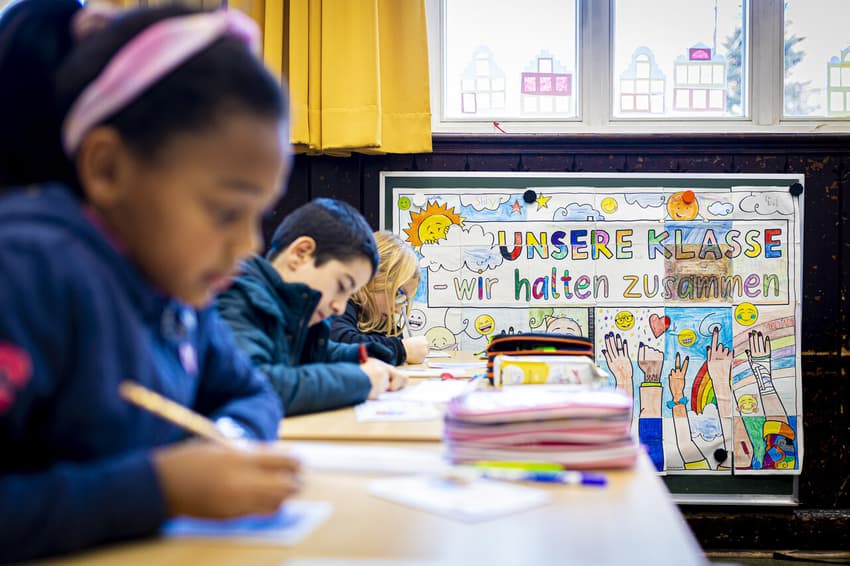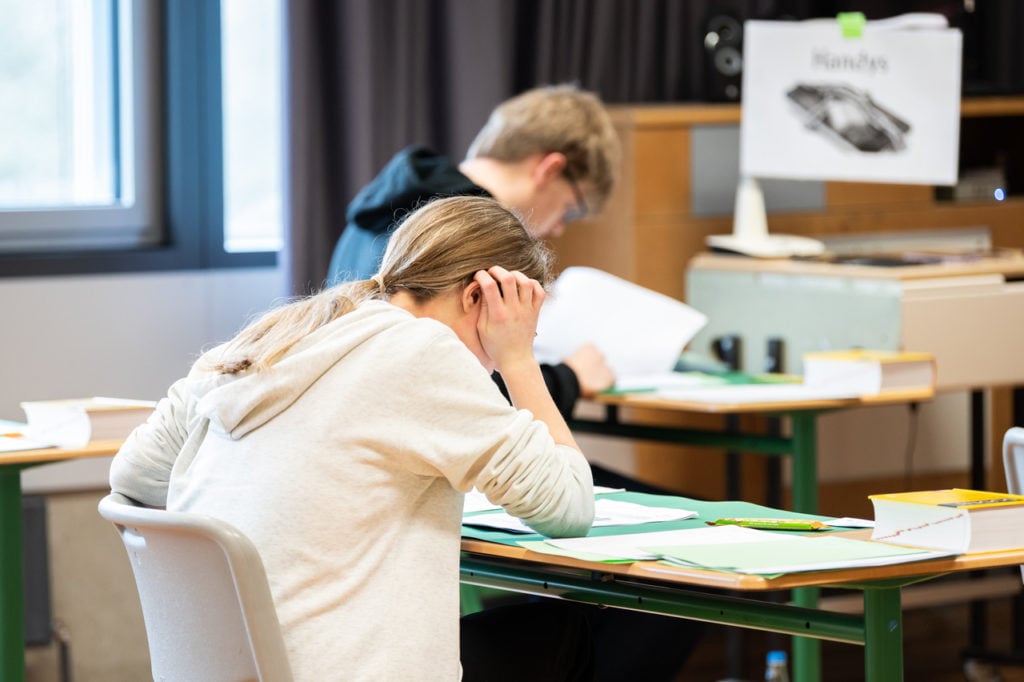Six surprising facts about Germany's school system

While many aspects of Germany's schooling system are well-known, there are several surprising features that set it apart from other countries' educational approaches.
Homeschooling is not allowed
In Germany, socialisation is seen as an inseparable part of education and as a result, taking your children out of school to teach them at home is prohibited by law.
Students from the ages of 6 to 15 are subject to the Schulpflicht ("school obligation") and must attend school, or else their parents can be punished by law. This rule has been confirmed in recent years by Germany's Federal Constitutional Court.
However, if parents want to enhance their children's learning by teaching them at home in addition to their school lessons, this is not a problem.
Early specialisation
One of the most surprising features of the German education system is how early children begin to "specialise", or follow a particular educational path.
Unlike some other education systems that offer a more generalised curriculum in secondary education, the German school system begins to channel students into different educational tracks relatively early.
READ ALSO: 'Alarming': How children in Germany are lagging behind on reading skills
While the school system differs slightly across each state, in general, there are three types of secondary school: Gymnasium, Hauptschule and Realschule.
The Gymnasium is the school for the most academic students, who go on to do the Abitur, which is an exam needed to get into university. Realschulen direct students to careers such as sales people, nurses and secretaries, while Hauptschulen help pupils progress into the commercial and industrial fields.

Students at the Leibniz Gymnasium in Rottweil sit the Biology Abitur exam. Photo: picture alliance/dpa | Silas Stein
The decision about which of these schools a child will attend is taken by the class teacher at the end of the Grundschule (primary school) in consultation with the parents when the student is around 10 or 11 years old.
This system, which aims to tailor education to students' individual abilities and interests, has been criticised for entrenching social inequalities and making a decision too early on that can have a significant impact on the future academic and career paths of students.
READ ALSO: What foreign parents should know about German schools
Special schools
While education systems in other European countries are moving towards more inclusive forms of education, Germany still has specific schools for children with special needs.
Förderschulen and Sonderschulen are two types of schools for children with a diverse range of special needs: including educational difficulties, physical disabilities, sensory impairments, and developmental disorders.
While these "special" schools aim to provide tailored support and a focused learning environment for students, they have also been subject to debates about inclusivity and integration.
READ ALSO: OPINION: Germany's unfair school system entrenches inequality
The policy has also been criticised for not meeting the 2008 EU-ratified UN Convention on the Rights of Persons with Disabilities, which calls for a more inclusive, integrated education for disabled students.
Critics say that by separating special-needs students, the German special education system fails, in that it puts disabled students at a disadvantage and prevents their integration into daily life.
An early school day
Traditionally, the German school day starts at 8:00 am and finishes at 1:00 or 2:00 pm. – and that is often still the case.
This means that schoolchildren in Germany often eat lunch at home and pursue sporting and hobby activities in local associations, rather than in a school sports team.
But in recent years, some schools in Germany have started offering a full day of education (Ganztagsschule). They offer study hours for homework, extracurricular activities and a hot lunch at the cafeteria.
Locally run schools
In Germany, schools are not run by the federal government but are a matter for the individual states. The Ministries of Education of the 16 federal states are responsible for deciding the range of subjects and curricula in schools and regulating transitions between different types of schools - for example if and how students could be allowed to move from a Realschule to a Gymnasium.
How well-equipped schools are also varies a great deal between regions, as school facilities are paid for by the local municipality. Those which lack funds or regional support may have ageing or incomplete facilities, while others may be fully digitalised, with well-stocked libraries and up-to-date sports equipment.
Lots of children learn Latin
While English is by far the most popular foreign language learned in secondary schools in Germany, followed by French, in third place is, surprisingly, Latin.
According to the latest statistics from the Federal Statistics Office, for the 2021/2022 school year, the dead language was studied by 6.4 percent or 539,000 children and adolescents, closely followed by Spanish with 5.9 percent or 496,000 learners.
In the last school year, more than four out of five students - 82.4 percent or 6.95 million - were learning English.
Comments (1)
See Also
Homeschooling is not allowed
In Germany, socialisation is seen as an inseparable part of education and as a result, taking your children out of school to teach them at home is prohibited by law.
Students from the ages of 6 to 15 are subject to the Schulpflicht ("school obligation") and must attend school, or else their parents can be punished by law. This rule has been confirmed in recent years by Germany's Federal Constitutional Court.
However, if parents want to enhance their children's learning by teaching them at home in addition to their school lessons, this is not a problem.
Early specialisation
One of the most surprising features of the German education system is how early children begin to "specialise", or follow a particular educational path.
Unlike some other education systems that offer a more generalised curriculum in secondary education, the German school system begins to channel students into different educational tracks relatively early.
READ ALSO: 'Alarming': How children in Germany are lagging behind on reading skills
While the school system differs slightly across each state, in general, there are three types of secondary school: Gymnasium, Hauptschule and Realschule.
The Gymnasium is the school for the most academic students, who go on to do the Abitur, which is an exam needed to get into university. Realschulen direct students to careers such as sales people, nurses and secretaries, while Hauptschulen help pupils progress into the commercial and industrial fields.

The decision about which of these schools a child will attend is taken by the class teacher at the end of the Grundschule (primary school) in consultation with the parents when the student is around 10 or 11 years old.
This system, which aims to tailor education to students' individual abilities and interests, has been criticised for entrenching social inequalities and making a decision too early on that can have a significant impact on the future academic and career paths of students.
READ ALSO: What foreign parents should know about German schools
Special schools
While education systems in other European countries are moving towards more inclusive forms of education, Germany still has specific schools for children with special needs.
Förderschulen and Sonderschulen are two types of schools for children with a diverse range of special needs: including educational difficulties, physical disabilities, sensory impairments, and developmental disorders.
While these "special" schools aim to provide tailored support and a focused learning environment for students, they have also been subject to debates about inclusivity and integration.
READ ALSO: OPINION: Germany's unfair school system entrenches inequality
The policy has also been criticised for not meeting the 2008 EU-ratified UN Convention on the Rights of Persons with Disabilities, which calls for a more inclusive, integrated education for disabled students.
Critics say that by separating special-needs students, the German special education system fails, in that it puts disabled students at a disadvantage and prevents their integration into daily life.
An early school day
Traditionally, the German school day starts at 8:00 am and finishes at 1:00 or 2:00 pm. – and that is often still the case.
This means that schoolchildren in Germany often eat lunch at home and pursue sporting and hobby activities in local associations, rather than in a school sports team.
But in recent years, some schools in Germany have started offering a full day of education (Ganztagsschule). They offer study hours for homework, extracurricular activities and a hot lunch at the cafeteria.
Locally run schools
In Germany, schools are not run by the federal government but are a matter for the individual states. The Ministries of Education of the 16 federal states are responsible for deciding the range of subjects and curricula in schools and regulating transitions between different types of schools - for example if and how students could be allowed to move from a Realschule to a Gymnasium.
How well-equipped schools are also varies a great deal between regions, as school facilities are paid for by the local municipality. Those which lack funds or regional support may have ageing or incomplete facilities, while others may be fully digitalised, with well-stocked libraries and up-to-date sports equipment.
Lots of children learn Latin
While English is by far the most popular foreign language learned in secondary schools in Germany, followed by French, in third place is, surprisingly, Latin.
According to the latest statistics from the Federal Statistics Office, for the 2021/2022 school year, the dead language was studied by 6.4 percent or 539,000 children and adolescents, closely followed by Spanish with 5.9 percent or 496,000 learners.
In the last school year, more than four out of five students - 82.4 percent or 6.95 million - were learning English.
Join the conversation in our comments section below. Share your own views and experience and if you have a question or suggestion for our journalists then email us at [email protected].
Please keep comments civil, constructive and on topic – and make sure to read our terms of use before getting involved.
Please log in here to leave a comment.